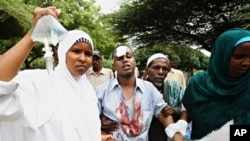Somalia's United Nations-backed Transitional Federal Government, under former Islamist opposition leader Sharif Sheik Ahmed, took office in January - raising hopes the country's Islamist-led insurgency against the government would end. But Mr. Sharif's ascension to power further intensified the conflict and, nearly one year later, the government remains weak and unable to unite the country.
Eleven months ago, Somalia's transitional parliament approved a U.N.-mediated deal that paved the way for former Islamist opposition members, led by Sharif Sheik Ahmed, to join the government.
As a moderate leader of the Islamic Courts Union, which briefly held power in Somalia in 2006 before it was ousted by neighboring Ethiopia, Sharif held the hopes of Western nations that he could fight the spread of Islamic extremism and reconcile with Islamist nationalist opponents of the transitional federal government.
At the inauguration ceremony for President Sharif in January, the U.N. envoy to Somalia, Ahmedou Ould-Abdallah, voiced the hope of millions of ordinary Somalis, who had suffered through 18 years of civil war and 14 failed attempts to establish a functioning central government in the country.
"Mr. President, ensure that today's election is a break from past practices. The failures and success of the last two decades should provide important political lessons and help you move forward in a positive spirit of reconciliation," he said.
Under pressure from the international community, Ethiopia ended its unpopular two-year occupation of Somalia and withdrew its troops. The move should have provided President Sharif an opportunity to begin reconciliation talks with opponents. But al-Qaida-linked al-Shabab militants and Islamist nationalists branded the Somali leader a "traitor" for negotiating with the West. The Islamist opposition groups formed an alliance to intensify the insurgency against the TFG.
A Horn of Africa analyst for the Institute for Security Studies in South Africa, Paula Roque, says Somalis and the international community had unrealistic expectations that President Sharif could quickly end the insurgency with a government that had neither the experience nor the resources to tackle its opponents, especially al-Shabab.
"Al-Shabab is a strong, military force," she said. "If they are going to counter al-Shabab, they will have to counter in terms of providing a sense that the government has structures that can administer a territory. They also have to tackle al-Shabab politically, ideologically and militarily. In terms of the transitional federal government, you have a whole structure, which is in absolute chaos. Even though we have millions of dollars that have been pledged by the international community to Somalia, there are many impediments to getting the money released."
Public disenchantment with the TFG began to grow after powerful factional leaders - blamed for perpetuating clan-based violence and chaos in Somalia for nearly 20 years - stayed in government as lawmakers and ministers. President Sharif also faced a growing number of critics, who accused him of doing little to curb rampant corruption that had derailed previous administrations. The government was also sharply criticized for not providing adequate security for millions of civilians caught in the anti-government insurgency.
In early May, Islamist fighters launched a major offensive against government and pro-government forces in the Somali capital, Mogadishu. Unable to rely on untrained and poorly-paid troops to quell the violence, government leaders turned to several thousand African Union peacekeepers to protect them and to prevent key installations in the capital from falling into insurgent hands.
Several weeks later, the government issued an urgent request for troops from neighboring countries to help defend against Somali militants and foreign fighters pouring into the country. The call for help caused many ordinary Somalis to question whether they should be backing a government that appeared to be on the brink of collapse.
Meanwhile, the AU peacekeeping force, known as AMISOM, had also become a target for insurgent mortar attacks, roadside bombings and suicide missions. In response, the peacekeepers repeatedly bombarded insurgent hideouts, which were often located in densely-populated neighborhoods. Each event triggered public resentment and anger - not only toward the insurgents, but also toward the peacekeepers and the Somali government they protected.
During Secretary of State Hilary Clinton's visit to Kenya in August, she met President Sharif to pledge continued American support for the transitional government. Speaking to VOA shortly before the meeting, a policy advisor for the Washington-based Enough Project, Colin Thomas-Jensen, said he believed that Western support of the TFG - particularly military support from the United States - had been counter-productive.
"The TFG is unable to extend its authority and is really relying on support from African Union forces and foreign backing to arm itself against Islamic militants. So, Sheik Sharif is certainly not winning any political points inside Somalia. When you have the United States - an actor that is not trusted by many Somalis - lining up in support of this transitional government, you certainly do create fodder for those attempting to portray Sheik Sharif as a puppet of the West and you also eased the recruitment of extremists to fight the TFG and potentially threaten the United States and other targets in the region," said Thomas-Jensen.
As the transitional government enters its second year under President Sharif, U.S.-based Horn of Africa analyst J. Peter Pham says it remains shaky as ever.
"I think that the TFG has survived is a milestone. But it is more attributable to the strategic mistakes by its enemies than any positive action it has done on its own," he said.
Many analysts predict Somalia in the coming year will continue to be engulfed in violent power struggles that could determine whether Somalia unites under a central government or breaks up into competing regions.
News
Shaky Somalian Transitional Federal Government Hangs On
update

Many analysts predict Somalia in the coming year will continue to be engulfed in violent power struggles that could determine whether Somalia unites under a central government or breaks up into competing regions.



